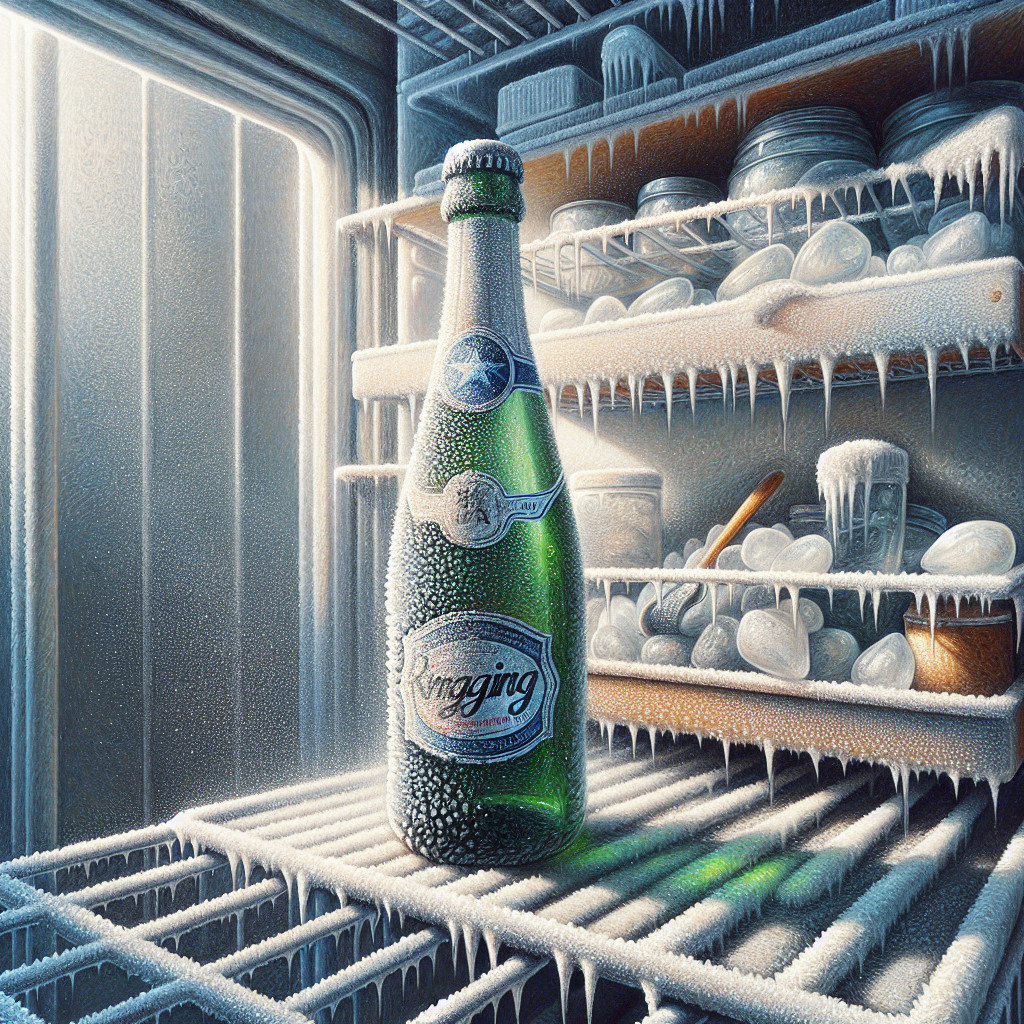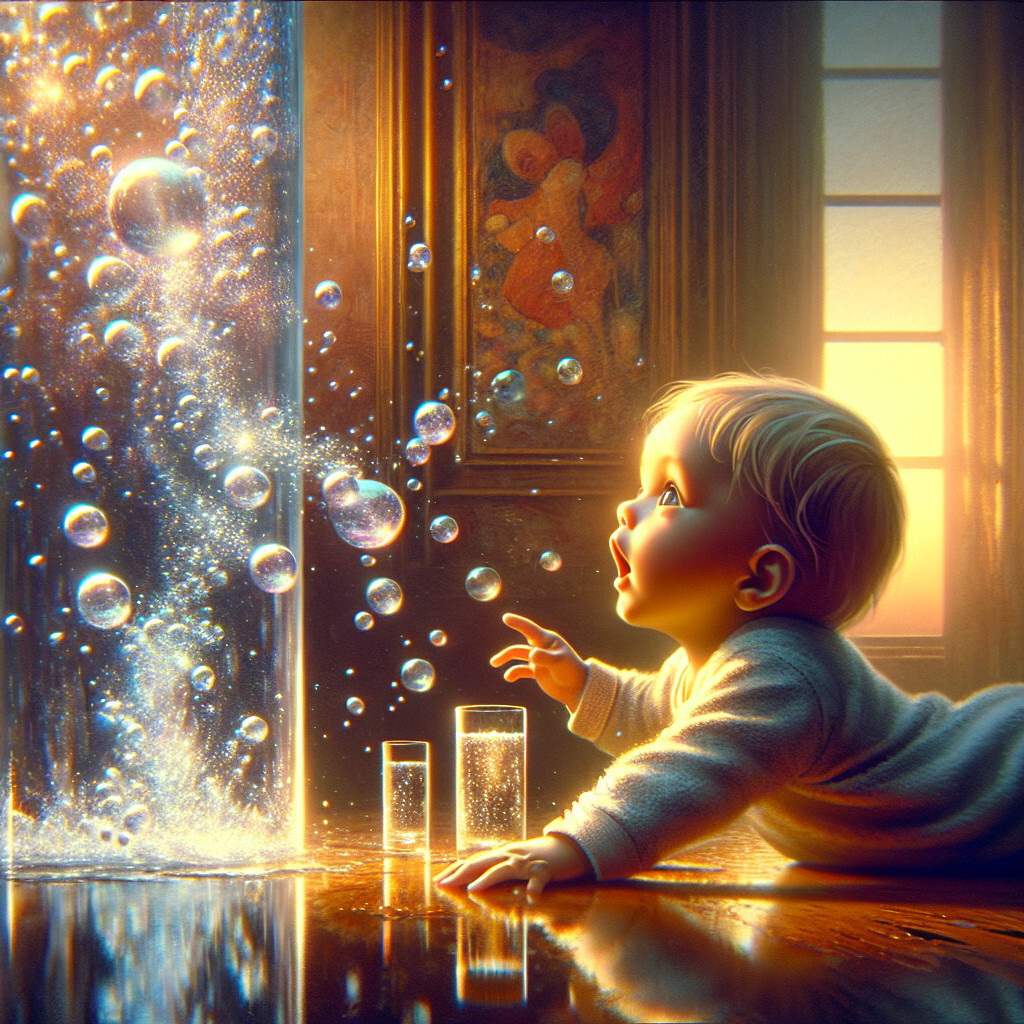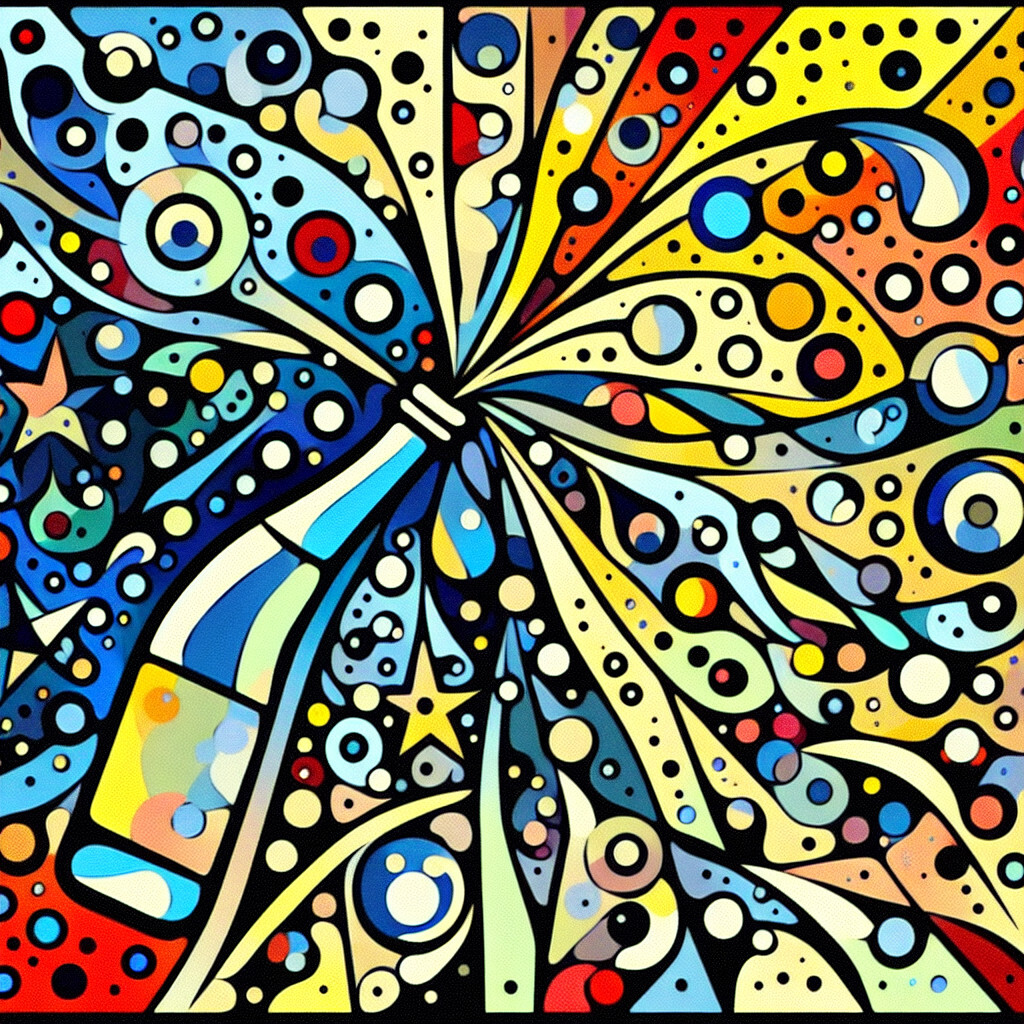-
Table of Contents
“Sparkling Water: Freeze it, Savor the Fizz!”
Introduction

Sparkling water, like any other type of water, can indeed be frozen. However, the carbonation that gives it its distinctive fizz will be lost in the freezing process. This is because the gas bubbles that create the carbonation are released when the water is frozen and then thawed. Therefore, while you can freeze sparkling water, it will lose its effervescence and become more like regular water once it’s defrosted.
Exploring the Effects of Freezing Sparkling Water
Sparkling water, also known as carbonated water, is a refreshing beverage that has gained significant popularity in recent years. It is essentially water into which carbon dioxide gas has been dissolved under pressure, resulting in a fizzy drink that many find enjoyable. However, a question that often arises is whether sparkling water can be frozen. The answer is yes, but the process and the outcome are not as straightforward as one might think.
When sparkling water is frozen, the carbon dioxide gas that gives it its characteristic fizz is forced out of the solution. This is due to the fact that the solubility of gases in liquids decreases as the temperature decreases. Consequently, as the sparkling water freezes, the carbon dioxide is expelled, resulting in a loss of carbonation. Therefore, while you can freeze sparkling water, it will lose its effervescence and essentially become still water once thawed.
Moreover, the freezing process can also affect the physical properties of the water. When water freezes, it expands. This is a fundamental property of water and is the reason why ice floats on water. However, in the case of a sealed bottle of sparkling water, this expansion can cause the bottle to rupture or explode, which can be dangerous. Therefore, if you plan to freeze sparkling water, it is advisable to do so in an unsealed container to allow for the expansion of the water and the escape of the carbon dioxide gas.
Furthermore, it is important to note that the freezing point of sparkling water is slightly lower than that of regular water. This is due to the dissolved carbon dioxide, which lowers the freezing point of the water in a similar way to how salt lowers the freezing point of ice on roads. Therefore, sparkling water will take slightly longer to freeze than regular water.
In addition, the texture of the frozen sparkling water may be different from that of regular frozen water. The expulsion of the carbon dioxide gas during freezing can result in a more porous and less dense ice. This can affect the texture of the ice, making it softer and less crunchy than regular ice.
In conclusion, while it is possible to freeze sparkling water, the process results in a loss of carbonation, potential physical damage if frozen in a sealed container, a slightly lower freezing point, and a different texture of ice. Therefore, if you enjoy the fizz of sparkling water, it is best enjoyed fresh and not frozen. However, if you are looking for a way to chill your sparkling water without diluting it, consider using reusable ice cubes or chilling the bottle in the refrigerator. This will ensure that your sparkling water remains cold and fizzy, providing the refreshing experience that many have come to love.
Can Sparkling Water Be Frozen? Unveiling the Truth
Can sparkling water be frozen? This question has been a subject of debate for quite some time. Many people are curious about whether or not it’s possible to freeze sparkling water, and if so, what the results would be. This article aims to unveil the truth about this intriguing topic.
Firstly, it is important to understand what sparkling water is. Sparkling water, also known as carbonated water, is water into which carbon dioxide gas has been dissolved under pressure. This process, known as carbonation, gives the water its characteristic fizz or bubbles. Sparkling water can be natural or man-made, and it is often consumed as a refreshing, calorie-free alternative to sugary soft drinks.
Now, to answer the question at hand: yes, sparkling water can indeed be frozen. However, the process and the outcome are not as straightforward as freezing regular, non-carbonated water. When you freeze sparkling water, the carbon dioxide gas that gives the water its fizz escapes as the water solidifies. This means that once the frozen sparkling water thaws, it will no longer be fizzy. Instead, it will be flat, much like regular tap water.
Moreover, freezing sparkling water can also lead to a change in taste. This is because the process of freezing can alter the mineral content of the water, which can affect its flavor. Some people may find that frozen and then thawed sparkling water tastes slightly different from its original state.
Another point to consider is the container in which the sparkling water is frozen. If the water is frozen in a sealed container, such as a glass bottle or a can, the expanding ice can cause the container to burst. This is due to the fact that water expands when it freezes. Therefore, if you wish to freeze sparkling water, it is advisable to do so in a plastic container that has some room for expansion.
In conclusion, while it is technically possible to freeze sparkling water, the process can lead to a loss of carbonation and a potential change in taste. Furthermore, care must be taken to freeze the water in an appropriate container to prevent any accidents. Therefore, if you enjoy the fizz and flavor of sparkling water, it may be best to consume it in its liquid state and to store it in a cool, dry place.
However, if you are not concerned about losing the fizz, or if you are interested in experimenting with frozen sparkling water in culinary applications, such as in ice cubes for cocktails, then by all means, go ahead and freeze it. Just remember to use a suitable container and to be aware of the potential changes in taste.
In essence, the decision to freeze sparkling water depends on personal preference and intended use. As with many things in life, it’s all about finding what works best for you. So, whether you choose to freeze your sparkling water or enjoy it straight from the fridge, the most important thing is that you enjoy every sip.
The Science Behind Freezing Sparkling Water
Sparkling water, also known as carbonated water, is a refreshing beverage enjoyed by many. It is essentially water into which carbon dioxide gas has been dissolved under pressure, resulting in a bubbly drink that also provides a slight tangy taste. A question that often arises among sparkling water enthusiasts is whether or not it can be frozen. The answer to this question is not as straightforward as one might think, and it involves a bit of science.
To understand the process of freezing sparkling water, it is important to first comprehend the nature of carbonation. When carbon dioxide is dissolved in water under pressure, it forms carbonic acid, which gives sparkling water its characteristic fizz and tang. However, this process is reversible. When the pressure is released, such as when the bottle is opened, the carbon dioxide starts to escape from the water, leading to the formation of bubbles.
Now, let’s consider what happens when water freezes. The freezing point of water is 0 degrees Celsius (32 degrees Fahrenheit). When water reaches this temperature, the molecules slow down and start to form a solid structure, turning the water into ice. However, the presence of other substances, such as salts or gases, can affect this process. This is where the science behind freezing sparkling water comes into play.
When you freeze sparkling water, the carbon dioxide gas that was dissolved in the water under pressure begins to escape as the water turns into ice. This is because the solubility of gases in water decreases as the temperature drops. As a result, the gas is forced out of the solution, leading to the formation of bubbles in the ice. This is why ice made from sparkling water is often cloudy and filled with tiny bubbles.
However, the process of freezing does not completely remove all the carbon dioxide from the sparkling water. Some of it remains trapped within the ice, held in place by the pressure of the surrounding ice. When this ice is allowed to melt, the trapped carbon dioxide is released, causing the melted ice to fizz, much like sparkling water.
So, can sparkling water be frozen? The answer is yes, but with a caveat. While it is possible to freeze sparkling water, the resulting ice will not retain all the characteristics of the original beverage. The freezing process will force out much of the carbon dioxide, resulting in ice that is less fizzy than the original sparkling water. Furthermore, the ice will be cloudy and filled with tiny bubbles, unlike the clear ice typically made from still water.
In conclusion, while sparkling water can indeed be frozen, the process alters the beverage’s characteristics, particularly its carbonation. The science behind this involves the principles of solubility and the behavior of gases under changing temperatures and pressures. So, the next time you consider freezing your sparkling water, remember that while it is possible, the end result may not be quite what you expect.
Understanding the Impact of Freezing on Sparkling Water
Sparkling water, also known as carbonated water, is a refreshing beverage enjoyed by many. It is essentially water into which carbon dioxide gas has been dissolved under pressure, resulting in a bubbly drink that can be enjoyed on its own or used as a mixer in cocktails. However, a question that often arises is whether sparkling water can be frozen. The answer is yes, but the process and outcome are not as straightforward as freezing regular water.
When sparkling water is frozen, the carbon dioxide gas that gives the water its fizziness is forced out of the solution. This is due to the fact that the solubility of gases decreases as the temperature decreases. In simpler terms, as the sparkling water cools in the freezer, the gas that was once dissolved in the water begins to separate. This separation process is often visible in the form of bubbles that form and rise to the surface of the water.
As the freezing process continues, the water will eventually solidify into ice. However, the carbon dioxide gas that was forced out during the freezing process does not become part of the ice. Instead, it escapes into the air, leaving behind a block of ice that is essentially devoid of any carbonation. Therefore, while it is possible to freeze sparkling water, the resulting ice will not retain the fizzy characteristic of the original beverage.
Moreover, it is important to note that freezing sparkling water in a sealed container can be dangerous. This is because the pressure inside the container increases as the carbon dioxide gas is forced out of the water during freezing. If the pressure becomes too high, it can cause the container to explode. Therefore, if you choose to freeze sparkling water, it is recommended to do so in an open container to allow the gas to escape safely.
In addition, the texture of the ice made from sparkling water can be different from that of regular ice. This is because the bubbles of gas that form during freezing can create tiny pockets or cracks in the ice. As a result, the ice may be less dense and more brittle than regular ice. This difference in texture can affect the way the ice melts and its suitability for use in certain applications.
In conclusion, while it is possible to freeze sparkling water, the process results in a loss of carbonation and can potentially be hazardous if done in a sealed container. The resulting ice also has a different texture than regular ice due to the formation of gas bubbles during freezing. Therefore, if you enjoy the fizziness of sparkling water or need ice for a specific purpose, it may be best to enjoy your sparkling water unfrozen or to freeze regular water instead.
Q&A
1. Question: Can sparkling water be frozen?
Answer: Yes, sparkling water can be frozen.
2. Question: What happens when you freeze sparkling water?
Answer: When you freeze sparkling water, the carbonation will be lost during the freezing process, resulting in flat water once it’s thawed.
3. Question: Can freezing sparkling water damage the container?
Answer: Yes, if the sparkling water is in a sealed container, it can expand when frozen and potentially cause the container to burst or leak.
4. Question: Will the taste of sparkling water change after freezing?
Answer: Yes, the taste of sparkling water may change after freezing as the freezing process can cause it to lose its carbonation, resulting in a flat taste.
Conclusion
Yes, sparkling water can be frozen. However, due to the carbonation, the texture may become slushy and the water may lose its fizziness once thawed.





